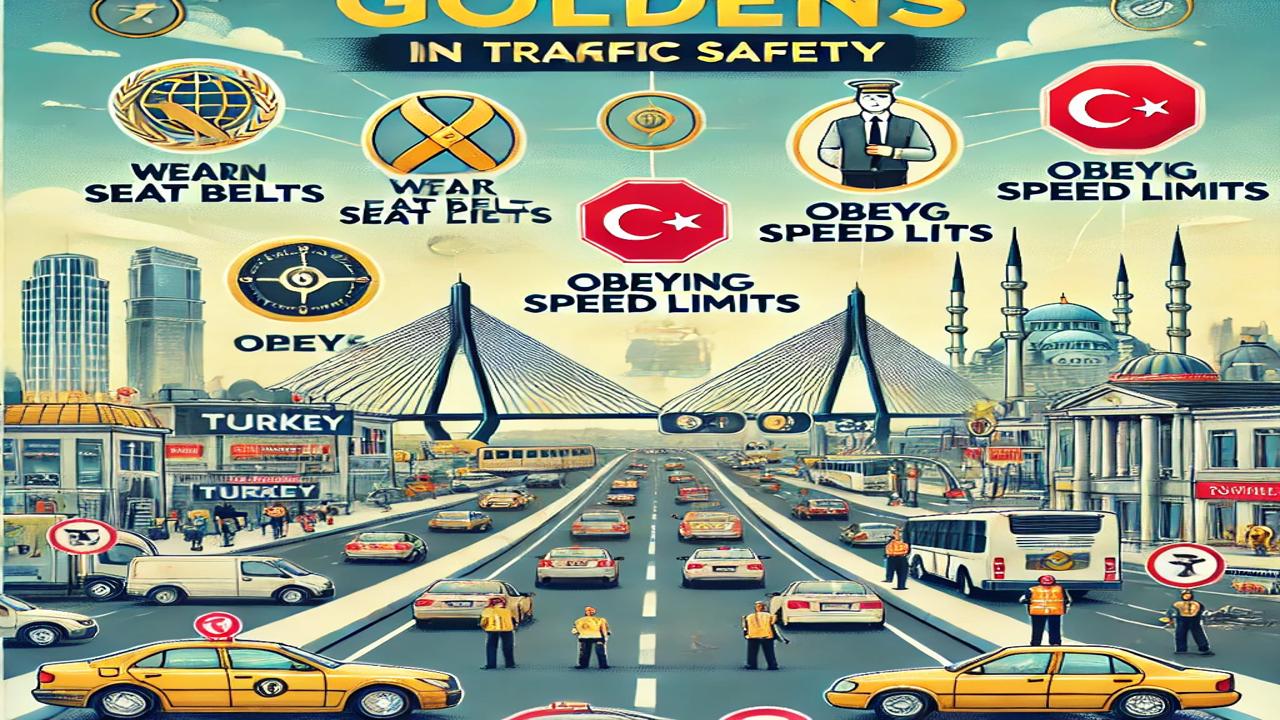Golden Rules for Traffic Safety: Practices in Turkey

1. Compliance with Speed Limits
Complying with speed limits is one of the most important steps in preventing accidents. In Turkey, the speed limit is usually 50 km/h in urban areas, and it can go up to 120 km/h on highways. Exceeding these limits not only results in penalties but also opens the door to serious accidents. Drivers can prevent accidents by adhering to speed limits.
2. Seat Belt Usage
Seat belts play a crucial role in traffic safety. In Turkey, it is mandatory for both front and rear passengers to wear seat belts. Wearing a seat belt significantly increases the chances of survival in the event of an accident. Seat belt usage is a life-saving rule for both drivers and passengers.
3. Alcohol and Drug Use Prohibition
Driving under the influence of alcohol or drugs is one of the most dangerous violations of traffic laws in Turkey. The legal blood alcohol limit is 0.50 g/l, and exceeding this limit results in severe penalties. Driving under the influence of alcohol or drugs endangers not only the driver's life but also the lives of other road users. Therefore, it is essential to avoid driving under the influence of alcohol or drugs.
4. Attention to Mobile Phone Usage
Using a mobile phone while driving is a major distraction that can lead to accidents. In Turkey, it is illegal to use a mobile phone while driving, including talking or texting. Mobile phone usage while driving can severely impair attention and is one of the main causes of traffic accidents. Therefore, restrictions on phone usage have been enforced with high fines.
5. Respect for Pedestrian Crossings
Pedestrian crossings are essential for the safety of pedestrians. In Turkey, drivers are required to give way to pedestrians at these crossings. This rule is vital for ensuring pedestrian safety and reducing traffic accidents. Stopping at pedestrian crossings is crucial for the safety of pedestrians and all road users.
6. Turn and Lane Change Rules
To maintain smooth traffic flow and prevent accidents, it is important to follow rules when changing lanes or making turns. In Turkey, it is mandatory to signal before changing lanes. Drivers must also be cautious when switching lanes and pay attention to other vehicles. Violating these rules can endanger both the driver and other road users.
7. Use of Lighting
When driving at night, using vehicle headlights improves visibility and helps other drivers notice your vehicle. In Turkey, using headlights while driving at night is mandatory. This is an important safety measure to reduce the risk of accidents and ensure a safer driving environment.
8. Parking and Stopping Rules
To maintain traffic safety, it is crucial to follow parking and stopping rules. In Turkey, vehicles must not block traffic flow when parked. Especially in areas close to schools or congested regions, drivers should be careful about parking restrictions. Illegal parking can lead to fines and traffic jams.
9. Child Safety
Children's safety requires special attention in traffic. In Turkey, it is prohibited for children under 12 to sit in the front seat. Additionally, it is mandatory for children to travel in appropriate child safety seats. These rules are in place to ensure that children are less likely to suffer severe injuries or fatalities in the event of an accident.
10. Compliance with Traffic Lights and Signals
Traffic lights ensure orderly traffic flow. In Turkey, running a red light puts both the driver and other road users at risk. Compliance with traffic lights and signals is a key factor in preventing accidents.
Conclusion
Traffic safety requires both individual and collective responsibility. The traffic rules in Turkey are designed to protect the lives of both drivers and pedestrians. Adhering to these golden rules for traffic safety is an important step in preventing accidents. Drivers, pedestrians, and all road users can protect themselves and others by following the traffic laws.










